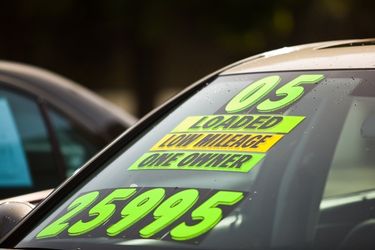
Written by Kayla Jane Barrie Updated on Dec 12, 2025 11 mins read

Are you thinking about buying a used car in Ontario? They are a great option. However, many people shy away because they are not educated about the steps to buying a used car. They are worried they’ll buy a lemon or get suckered into a bad deal – even with rising costs.
The used car market remains hot but unpredictable. Over the last few years, many automotive industries have been hit with shortages and inflated prices. Interest rates, supply chain issues, and chip shortages are still happening today.
According to a National Post article from February 2024, the average cost of a new car was $66,979, nearly 33% higher than the price mentioned in a February 2019 article, which was $45,255. Used vehicles have also become more expensive, with an average price of $38,451; in February 2019, it was $26,331.
Choosing the best used car to buy may have more challenges, but they are still a top option for drivers in the province. Getting some advice for buying a used car is a great first step. To help you out, we’ve put together this used car buying guide filled with advice and considerations.
Some used cars have been reported to be more expensive than new ones, according to The Guardian some used cars have been reported to be more expensive than new ones. We can look at a few areas that have caused the dramatic increase in used cars. One issue was the microchip shortages, which caused supply and manufacturing issues. If you are buying a used car in this market, act quickly and don’t refrain from negotiating.
Some reports show a slow decline in used car prices in Canada. According to CTV News Montreal, there was a drop of 0.04 between June and July 2022. Keep in mind inflation is expected to continue to rise. We may not see pre-pandemic pricing, but manufacturing and availability will hopefully improve.
However, according to a report in January 2024, auto sales rose by 11.8% in 2023 compared to the previous year, thanks to increased supply. This marks the largest YoY increase since 1997. As inventories stabilize, we may see the cost of used cars come down.
Let’s start by saying that buying used is not for everyone. Buying a used car is very different from buying a new one. There are a lot more considerations and even risks involved. However, there are also several advantages to buying used.
More people are buying used cars in Canada than you may realize. According to Driving.ca, there are more than 22 million used cars on the road today, making up about 65% of the market. This number is rising, which is why car dealerships are so eager to buy back your car after a lease.
There are many situations where buying a used car makes sense:
Buying a used car is a process, but you can feel good about your decision by taking certain steps. Here are essential tips to follow when buying a used car in the province:
A good number of kilometres on a used car would be between 50,000 to 100,000. People generally drive 15,000-25,000 annually, so you’ll want to keep in that range.
Anything over 120,000 can be problematic since that’s around the time many parts need to be replaced or may fail. If you buy a used car that is higher on the odometer, determine if it was maintained correctly and consider negotiating a tune-up or maintenance package with the dealership.
An often overlooked consideration when shopping for a used car is car insurance. Once you have an idea of the vehicle you want to purchase, it’s good to speak with an advisor to find proper coverage. You can purchase gap insurance from car dealerships and financing companies to ensure you are protected between vehicles.
Then you will know how much it will cost to insure the vehicle, especially if it’s a very different vehicle from the make or model you usually drive. Often, used cars have lower premiums.
Knowing how much it costs to insure a vehicle when exploring your options allows you to get a better sense of the total cost of driving per month, which can factor into your approach to negotiating.
There are always some important things to check when buying a used car. Not sure what to look for? Here is what to check:
Gathering as much information as possible is the key to making a solid used car purchase. One of the best ways to do this is to ask the seller many questions! Not sure what questions to ask? Here are some good questions to start with:
Ask as many questions as you have. If the buyer gets annoyed, agitated, or tries to close the deal quickly, it could be a sign they are hiding something. Remember, you can always walk away.
So, you have an idea of the type of car you want; now it’s time to research the list of vehicles you are considering. The good news is that you can use countless resources today to learn about the car you are considering. Here are some to use:
You should also ask for a UVIP (used vehicle package), which contains important information about the vehicle's history and maintenance.
Always test a vehicle you are considering, new or used. A test drive is more than just driving around the block and seeing if the car is comfortable. It is an opportunity to inspect, assess, and test out the vehicle. It’s always a good idea to bring someone else with you to give you a second opinion. Here is what to consider during your test drive:
If you’ve found a car you want to purchase, it’s time to negotiate. Rule number one is to always negotiate. The asking price is very seldom the firm final price for the person selling a car. It’s called an asking price for a reason. Here are some tips for negotiating:
There are two main payment options when you buy used:
Keep in mind that financing a used vehicle will increase the overall cost of the vehicle as you will have to pay interest and other finance fees. If you plan to finance, shop around to find the best option. Consider the dealer, credit union, or bank to get the lowest financing rates.

There isn’t a single best time to buy a used car in Ontario. In general, there are certain times that are better than others. Here are some good times to buy:
There are many places where you can shop for used cars. Today, the internet has become one of the most popular options to shop, but it’s not your only option. Auto dealerships, used car lots, newspaper ads, local auctions, and private sales are also options to consider.
Here are some of the best online sources where you can start your search:
As with any other purchase you make online, you need to be careful about who you do business with. Watch out for unlicensed dealers, online scams, and sellers looking to take advantage of you. Here are some quick tips :
Remember, if something doesn’t seem right, then it’s probably not. The beauty of buying used is that even if you back away from a deal, there will always be another one.
A dealership is one of the many sources where you can purchase a used car. If the online route is not for you, buying a used car from a dealership is a common option. Dealerships can offer various vehicle options, but they are often limited in terms of make and model. One thing they can offer is assistance with financing.
Many dealers also offer warranty packages for used cars. But, like with any other type of business, it’s important to do your homework and check out ratings and reviews of the dealership you are considering.
Like anything else, there are good dealerships and poor dealerships. Be diligent and shop around to find the right one for you.
Purchasing a used vehicle from a private owner is slightly different. If you are interested in purchasing the car, ask to see the seller's used vehicle information package. Make sure you carefully review the vehicle history.
Test drive the vehicle and have it inspected by a mechanic. If you purchase the car, make sure you take the package. Get the vehicle permit and bill of sale. You will need the plate portion of the vehicle permit to complete the transfer of car ownership.

When you buy a used vehicle, it’s important to know all costs, not just the purchase price. Additional cost considerations include:
When purchasing a used car from a dealer, carefully review your bill of sale for additional or hidden fees – registration, title, dealer, license, advertising, and emissions.
We’ve all heard the saying before – the minute a new car is driven off the lot, it will depreciate - a new $30,000 vehicle depreciates just over $2,500 in the first minute. Better make that first minute of driving worth it!
Many people still have a distorted view of the used car buying process. They envision buying a beater that always breaks down and is riddled with mechanical issues. This is not the case today (in most instances).
Here are the benefits of buying a used car in 2024:
Like any purchase, there are pros and cons. These are some potential drawbacks of purchasing a used car :
Yes. You must have valid insurance before you can drive. It’s recommended that you get proof of insurance to complete your transaction.
You should speak with your advisor and get Ontario car insurance in order before buying. You cannot drive your vehicle without proper coverage in place. Most dealerships require proof of insurance to complete the purchase.
Certified pre-owned vehicles tend to be more expensive because they go through a more detailed inspection process. An extended warranty is also often offered, as well as incentives and financing options.
Many recommend not buying used cars that were previously rental vehicles. Rental vehicles typically are driven harshly and have a lot of wear and tear.
If you are shopping for a used EV, consider the model's reliability, have it inspected by someone you trust or a professional, and consider the charging infrastructure around your home. Once you have decided which ride you’re taking home, be sure to contact us to learn more about electric car insurance.
It’s recommended to buy a used car or used pickup truck with mileage under 150,000 km—anything close to 200,000km (or over!) is not a great idea since that’s when cars usually begin to have expensive issues.
When you are comparing buying or leasing a car, you may be surprised to learn that you can lease a used vehicle. You’ll have success leasing a used car if you have a good credit score, drive minimal kilometres, and have a budget for lease payments. There may be options to lease or own, or partake in a lease takeover.
Get as much information about the vehicle as possible before buying used. Get a vehicle history report, get the car inspected by a licensed mechanic, ask the seller many questions, test drive the vehicle, and make sure you follow all transfer of ownership rules.
| Categories | Auto |
|---|---|
| Tags | Buy and Sell Vehicles |
Read our insurance blog to get helpful tips, information and news.
Find out if a seatbelt ticket will raise your car insurance rates and how insurers view seatbelt violations.
Ontario’s Project CHICKADEE dismantled a $25 million auto theft ring. Discover how this massive bust targets export enablers and what it means for rising Canadian insurance premiums.
Think refusing a breath test helps your case? In Ontario, it results in a minimum fine of $2,000 and a criminal record. Compare the penalties and protect your future.
Impaired driving in Ontario is a serious offence. Learn about impaired driving fines, penalties, statistics and other important information all drivers in Ontario need to be aware of before they get behind the wheel.